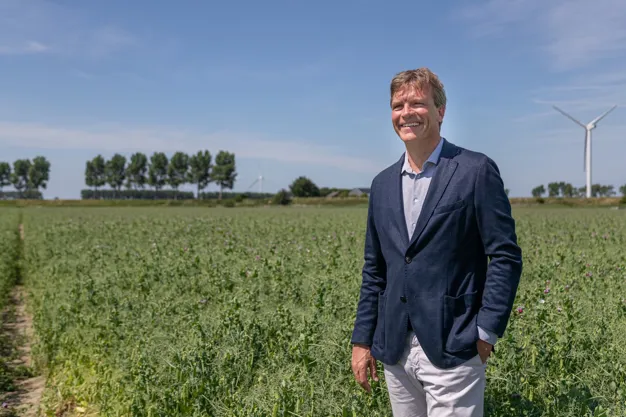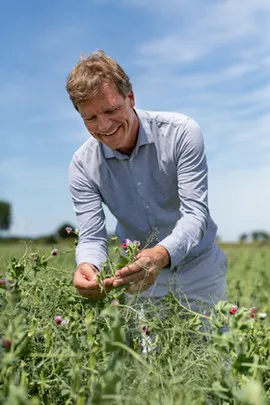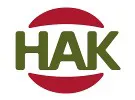By 2027, all vegetables and legumes cultivated for HAK in the Netherlands must be organic. This canned goods manufacturer announced this goal at the Biobeurs yesterday. Every crop will be converted, starting with red beets, which will be sold as organic this fall. Next year, sauerkraut, kale, spinach, and Brussels sprouts will follow. At stake: 85% of HAK's total volume. Initial estimates are that the company's 3,000 hectares will account for about ten percent of the total growth of Dutch organic arable land.
Switching entirely
HAK is not opting for a separate organic line but has decided to convert its entire range. "Ten years ago, we sold organic products, but on the side. That didn't work because organic had too much of an exclusive character. We have to move away from that," begins Timo Hoogeboom, HAK's CEO. The company wants to make organic available to everyone.
"Europe and its governments have committed to expanding the organic market and production. There's no way back, but something big has to happen to go from [the Netherlands' current] four percent to 15% organic farming. We're trying to kickstart that movement. We strongly urge growers, other food producers, supermarkets, and the government to get involved."
 "We must move away from the idea that organic is exclusive," says HAK's CEO Timo Hoogeboom.
"We must move away from the idea that organic is exclusive," says HAK's CEO Timo Hoogeboom.
Broilers
Timo draws the comparison to broilers. These disappeared from Dutch supermarket shelves in 2023 due to efforts from, among others, Wakker Dier, a Dutch animal welfare organization. "We must move toward a situation where more sustainable products replace those that actually cost far more than they are offered to consumers," he says.
"Where possible, we should offer people only organic products. Sustainability shouldn't be a choice but the norm. That's also why we're switching the vegetables and legumes we grow in the Netherlands to organic as soon as possible. Then, shoppers no longer have to make that choice."
On the way to PlanetProof
HAK has been working on making its cultivation sustainable for some time. For the past five years, all HAK products have been certified On the way to PlanetProof. "Five years ago, we also didn't offer a choice," Timo continues.
That experience motivated this next step. "Switching to On The way to PlanetProof showed us it's possible to achieve solid goals that have both social value and earning power for growers."
It is unclear whether HAK will keep On the Way to PlanetProof. "It could be that, in the beginning, we'll have both. Some things certified one way and not the other. We'll keep looking at that; we don't want to take steps backward in sustainability."
Price is the biggest challenge
Organic cultivation requires a different way of working, involving higher costs and, often, lower yields. That is why organic products are often far pricier. Timo considers price "the biggest challenge and concern. Its price contributes to organic's exclusive nature. We'll have to use knowledge and scale economies to narrow the organic vs. regular price gap," he explains.
How much more a jar of carrots will cost is still hard to estimate. "In these uncertain times of food inflation and geopolitics, we cannot gauge what our prices will be ten months from now. Neither are we in charge of store prices. We're well aware that this transition plan will fail if we start pricing ourselves out of the market. We're taking a big risk, which is why it's a five-year plan. Like any investment, you must put in before you get out."
Paying growers
This HAK strategy's success depends on how the organic market and official policy develop further in the coming years. According to the company, switching can be encouraged in the Netherlands with  measures like transition fees for growers, VAT exemption for organic products, and campaigns to make the organic offer attractive and accessible to consumers.
measures like transition fees for growers, VAT exemption for organic products, and campaigns to make the organic offer attractive and accessible to consumers.
"The government will have to devise a good plan to ensure that it's attractive for growers to convert. I also think, in the context of the nitrogen saga, some arable farmers need a solution. Organic can be a good one," says Hoogeboom.
"But then, they'll need to be compensated and rewarded for the risk they're taking. And they'll need certainty to begin. That's why we want to make five-year-plus agreements with growers. We want to begin realizing not only the scale increase but also the knowledge and things organic farming can teach, yield-wise."
HAK is already talking to all its growers are their associations to see how they can switch to organic. "How attractive it is for them to convert to organic depends on what else they grow. Some only have a limited part of their cultivation plan devoted to us," Timo adds, "so, for them, there's no urgency to switch. We'll thus be looking for new growers and grower associations. Growers' earning models won't be threatened in any way."
Resilient crops
Timo calls this step strategically crucial for the company's future. "Our vegetable and legume cultivation depends on healthy soil and biodiversity. Robust, resilient, nutritionally sufficient crops can grow for a long time in healthy soil," he concludes.
 For more information:
For more information:
HAK
Tel: +31 (0) 183 446 500
Website: www.hak.nl
